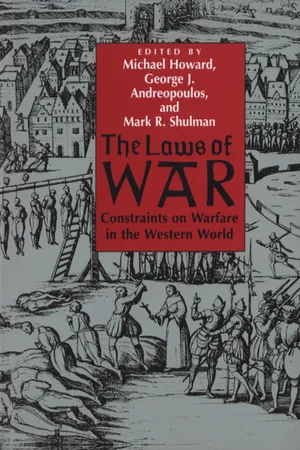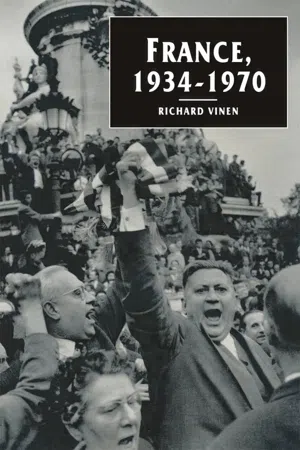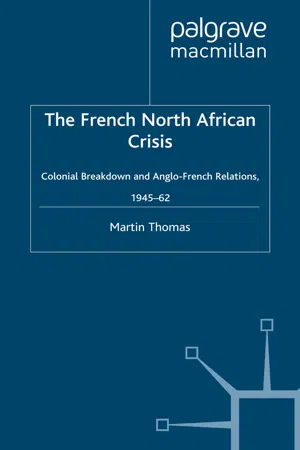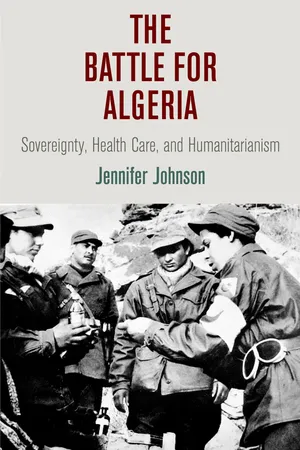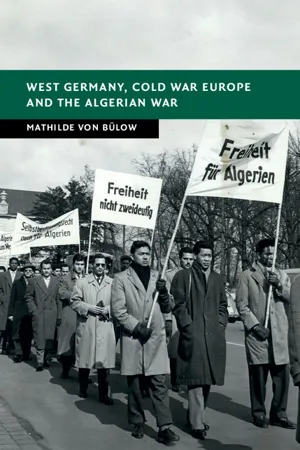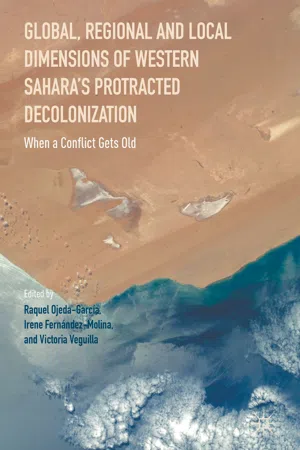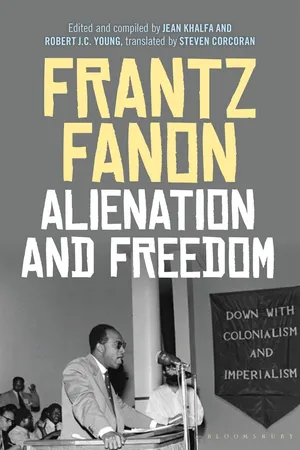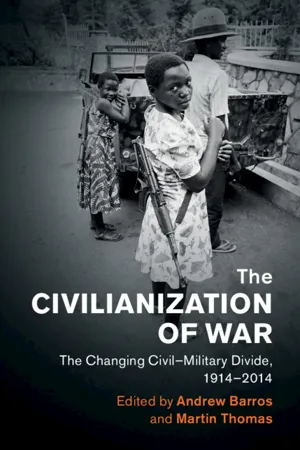Politics & International Relations
Algerian War
The Algerian War, also known as the Algerian War of Independence, was a conflict between France and the Algerian independence movements from 1954 to 1962. The war resulted in Algeria gaining independence from France and marked the end of over a century of colonial rule. The conflict had significant political, social, and economic implications for both Algeria and France.
Written by Perlego with AI-assistance
Related key terms
1 of 5
9 Key excerpts on "Algerian War"
- eBook - PDF
The Laws of War
Constraints on Warfare in the Western World
- Michael Howard, George Andreopoulos, Mark R. Shulman(Authors)
- 1994(Publication Date)
- Yale University Press(Publisher)
The second development had to do with the interna-tional community's slow and tortuous adjustment to the challenge posed by the Algerian War of Independence. This war contributed more than any other single event to the passage of Resolution 1514 (XV), the Declaration on the Granting of Indepen-dence to Colonial Countries and Peoples, on December 14, I96o, 45 and to the pre-mature recognition of movements fighting wars of national liberation. To understand the importance of this war, we will briefly examine some of its key aspects. The Algerian War was to become the test case for the relevance of the traditional distinction between international and internal wars. The nature of the war remained in dispute between the French and the FLN until the very end. For the French, the war was nothing more than an internal rebellion to be suppressed by all means necessary in order to restore domestic order. For the FLN, it was a war of national liberation which entitled them to the protection offered by international legal norms. The 200 Age of National Liberation Movements conflict lasted for almost seven and a half years and was fought with uncommon ferocity. 46 Almost from the beginning it was termed a sale guerre (dirty war). It was a characterization that reflected both the predisposition of the participants and the issues at stake: for the Algerians it was the long-overdue overthrow of colonial rule; for the French, coming on the aftermath of the humiliating defeat in the Indochinese War, it represented the last opportunity to reverse the passing of national greatness and the concomitant demise of la mission civilisatrice. 47 What compounded the problem was the existence of a million and a half Algerians of French descent, the pieds-noirs. For them any change in the status of Alg6rie-Frangaise was tantamount to a threat to the very existence of their community. - eBook - PDF
- Richard Vinen(Author)
- 1996(Publication Date)
- Red Globe Press(Publisher)
12 Algeria The Algerian War began on 1 November 1954 with attacks by Algerian nationalists on French citizens. The nationalists, grouped by the Front de Liberation Nationale (FLN), wished to end the French rule of their country which had begun in 1830. Part of the French response to these events consisted of a rather half-hearted pro-gramme of reforms that were instituted in January 1955. The other part of the French response was repression. - eBook - PDF
The French North African Crisis
Colonial Breakdown and Anglo-French Relations, 1945–62
- M. Thomas(Author)
- 2000(Publication Date)
- Palgrave Macmillan(Publisher)
5 France Undermined? French International Power and the Algerian War, 1954±58 No postwar British government thought that French North Africa could survive intact as a quasi-colonial confederation. It remains difficult to disentangle the threads of British policy towards the region in the 1950s because Whitehall policy-makers were generally sceptical, and some- times unsure, about the worth of these territories to France. More importantly from their perspective, there was always a tension between support for France as an ally and the inevitable anger this caused among client Arab states, Commonwealth members and the non-aligned move- ment. The consolidation of independent nation-states from Syria to Libya further intensified Arab hostility towards the survival of French imperial control. 1 Jacques Marseille has argued persuasively that the numerous French industries that relied on imperial markets in the interwar period were in full retreat from colonial trade by the 1950s. The primary products typically exported from French Africa were by then more widely avail- able on the open market, and those territories whose currency was linked to the French franc did not produce goods for export at much saving to France. As a result, neither the French industrial sector nor its agricul- tural market depended on French North Africa remaining under the tricolour. Furthermore, many of the businesses that still traded heavily with the Maghreb territories were uncompetitive and short of private venture capital. It was hardly surprising in light of the uncertain political future of overseas territories that the shrewd French investor did not reckon North-West Africa an attractive proposition by the time the Algerian War began. 2 In real terms, French North Africa was becoming a drain on the French economy before the costs of policing and war turned the trickle of French funds to the Maghreb into a flood. - eBook - PDF
The Battle for Algeria
Sovereignty, Health Care, and Humanitarianism
- Jennifer Johnson(Author)
- 2015(Publication Date)
- University of Pennsylvania Press(Publisher)
The long history of French colonial rule in Algeria is littered with in-stances of violence, legal and political inequality, a small but extremely influ-ential European settler population, and repeated failure by innumerable colonial administrators to implement meaningful reform. Beginning in the 1920s, Algerian elites began formulating political groups, and for the next thirty years before the official start of the war for national liberation they pursued avenues ranging from assimilation to a Pan-Islamic ‘umma (com-munity). Important moments in Franco-Algerian relations during the 1930s and 1940s further strengthened nationalist sentiment, yet I argue World War II outcomes—the 1941 Atlantic Charter, the American presence in Algeria beginning in the fall of 1942, the May 1945 Sétif and Guelma massacres, the creation of the United Nations and its charter, the Universal Declaration of Human Rights, and the Geneva Conventions of 1949—were the most critical developments for Algerian nationalists. The texts provided a new discourse about rights from which anticolonial activists drew liberally, depending on the time and place. By 1954 when the FLN announced itself as the leading nationalist group, its representatives, many of whom had been active in politics for several de-cades, used these changes to the international system to their political advan-tage and started cultivating their winning strategy of deploying universal rights rhetoric in order to appeal to an international audience. Despite their uneven use of rights discourse, Algerians most certainly relied upon the con-cepts of self-determination and international law to build their case for na-tional sovereignty. The nationalists combined this international approach with an equally important local strategy in Algeria. Their quest for national liberation from France could not, and did not, hinge solely on the interna-tional arena, as some historians suggest. 10 - Mathilde Von Bulow(Author)
- 2016(Publication Date)
- Cambridge University Press(Publisher)
175. 53 Cited in: Charles-Robert Ageron, ‘L’Opération de Suez et la guerre d’Algérie’, in France et Suez (ed.) Vaïsse, p. 43; Thomas, French, p. 210. Internationalising colonial warfare 39 broadsheet La Croix referred to ‘a plot directed from abroad’. 54 Though they were more nuanced, similar voices could also be heard from left-wing exponents of colonial devolution and reform. On 12 November 1954, Prime Minister Mendès-France declared before the National Assembly that the rebels ‘had received encouragements from abroad, as well as provo- cations of the most extreme order’. 55 Even Claude Bourdet, a journalist well known for his anti-colonialism, commented in France-Observateur that one ‘could not exclude the possibility that agents provocateurs were able to play on the exasperation of extremists in order to put a stop to any positive evolution [in Algeria] by sparking further repression’. 56 Faced with the ignominy of Dien Bien Phu, the escalation of nationalist unrest in Morocco and Tunisia and the inflammatory rhetoric emitting from Voice of the Arabs, one can understand why so many French observers believed the international context had contributed to the onset of the Algerian War. After all, the FLN did draw its inspiration from global developments and did enjoy international support. Even so, no matter how jealously it guarded its independence from external control, French observers found it difficult to accept the FLN as a home-grown movement, let alone one that would come to enjoy widespread popular support. Policy-makers and military officers thus misconstrued the nature of the FLN’s relationship with the foreign forces that stood accused of meddling in Algeria.- eBook - PDF
Global, Regional and Local Dimensions of Western Sahara's Protracted Decolonization
When a Conflict Gets Old
- Raquel Ojeda-Garcia, Irene Fernández-Molina, Victoria Veguilla, Raquel Ojeda-Garcia, Irene Fernández-Molina, Victoria Veguilla(Authors)
- 2016(Publication Date)
- Palgrave Macmillan(Publisher)
121 © The Author(s) 2017 R. Ojeda-Garcia et al. (eds.), Global, Regional and Local Dimensions of Western Sahara’s Protracted Decolonization, DOI 10.1057/978-1-349-95035-5_6 CHAPTER 6 Algerian Foreign Policy towards Western Sahara Laurence Thieux L. Thieux () Study Group on Arab and Muslim Societies (GRESAM) at the University of Castilla-La Mancha, Toledo, Spain e-mail: [email protected] This chapter presents some of the results of the research and development (R&D) project: “The international dimension of political transformations in the Arab World” (CSO2014-52998-C3-3-P) funded by the Spanish Ministry of Economy and Competitiveness. After 132 years of colonization, Algeria’s foreign policy has been closely linked to the nationalist project of state-building. It was during the battle for independence that the National Liberation Front (FLN) began to artic- ulate its foreign policy as a way of reinforcing its legitimacy and gaining the support it needed to carry out its nationalist project. After independence, the territorial question featured prominently in the country’s international relations as an integral part of the process of nation-building aimed at strengthening the sovereignty of the young state over an Algeria defined by the borders inherited from the colonial period. Indeed, territorial issues lay at the root of the first conflict between Algeria and Morocco, the 1963 Sand War, the resolution of which would not resolve the border disputes between the two countries. In this climate of rivalry and distrust, the ques- tion of Western Sahara and the support given to the Polisario Front by the 122 Algerian leaders would counterbalance and contain Morocco’s irredentist ambitions. Since then, Algeria’s position has remained largely unchanged despite deep internal social, economic and political transformations in the country and the new challenges presented by its geostrategic position. - eBook - PDF
- Frantz Fanon, Jean Khalfa, Robert J. C. Young, Steven Corcoran(Authors)
- 2018(Publication Date)
- Bloomsbury Academic(Publisher)
559 Algeria and the French crisis That the war in Algeria, that the Algerian revolution, is the direct cause of the French political crisis is evident. The insurrection of 1 November 1954 was likely underestimated, if not even viewed with a certain scorn by French rulers. ‘What could a few hundred fellaghas (sic) do to counter the French police and gendarmerie not to mention its army?’ But little by little, the ‘blaze of terrorism’ has become a whole people’s formidable revolution, extending over the entire expanse of its territory. The whole Algerian Nation has gone into action in order to break colonialist domination and establish a sovereign state, a regime of freedom, peace and progress. Attempting to quash this national insurrection, the colonialists have poured more and more troops onto Algeria, and more and more powerful armaments. A French army personnel of about 80,000 men has grown to 800,000, not counting the policemen, gendarmes and auxiliaries. NATO divisions have even been withdrawn from France and from Germany and thrown against the growing force of the Algerian resistance. Armoured cars, planes, naval forces, the imperialist hordes are leaving nothing out. But France’s pursuit of this unjust and barbarous war is an inordinate cost to it. Not only is France losing human lives, the lives of its young soldiers and officers, but also hundreds of billions of francs, which is to say, a significant proportion of its resources. A UN commission estimated the yearly cost of the war in Algeria for France at 700 billion. To be added to this figure are the paramilitary and administrative expenditures linked to this war effort. Another cause of loss: the absence of more than half a million workers in the economic sectors and, in parallel, the need to import more from abroad to meet the needs of colonial war. Embarrassed in Algeria both on the economic and the military levels, France is absent from the international chessboard. - eBook - PDF
- Mike Gane(Author)
- 2003(Publication Date)
- SAGE Publications Ltd(Publisher)
10 The Algerian War … a remarkable sociological situation: if French imperialism has not to this day managed to provide this society with any other mode of organisation than that of terror, it is because no institution can currently respond satis-factorily to the needs of the Algerians … Algerian society is ‘destructured’ [ déstructurée ]. (Lyotard, 1993b: 223) After the moment of the Resistance and Liberation of the 1940s, the 1950s were dominated by the Algerian movement and war for independence. This again radicalised many intellectuals on the left. Baudrillard later reflected ‘the Algerian War … had a vital part to play, a kind of Marxist-type politici-sation’ and for him the main influence in this was Sartre (1993a: 20). Sartre’s own involvement was significant, but his writings reveal that his main concern was the ‘colonial system’ and the role of de Gaulle in the war and its resolution (Sartre, 2001). Sartre also played a key symbolic role for intellectuals such as Fanon (1967, 1970), and by his support for the develop-ment of journals such as Diop’s Présence Africaine , and organisations and conferences like the Congress of Black Writers and Artists at the Sorbonne in 1956 (see Young, in Sartre, 2001: xx). Other intellectuals like Bourdieu, who had done anthropological field-work in Algeria, composed studies such as Sociologie de l’Algérie . Bourdieu presented a survey of the different cultures and communities in Algeria, focusing mainly on the ones he had closely studied, but sketched his own picture of the colonial system (Bourdieu, 1958: 106f.), the imposed ‘decul-turation’ it effected, and then presented a profile of an emerging new class structure. This, he said, was a completely ‘original social classes structure’ composed of an immense ‘sub-proletariat, uprooted, and unstable’ at the base of a hierarchy of proletariat, petite-bourgeoisie, and bourgeoisie arising around a very feeble industrial development (1958: 124–5). - eBook - PDF
The Civilianization of War
The Changing Civil–Military Divide, 1914–2014
- Andrew Barros, Martin Thomas(Authors)
- 2018(Publication Date)
- Cambridge University Press(Publisher)
Prisoners during the Algerian War 103 were entirely unthinkable in Algeria. The demarcations between commu- nities with a common fate were obvious to everyone, and the expectation was that one’s primary loyalty was to one’s own group: Algerian or European. While comradeship and trust did exist, in a time of crisis, the colonial barrier between ‘us’ and ‘them’ became more starkly apparent. In May 1945, Algerian nationalists demonstrated in the streets of some cities in eastern Algeria, calling for independence. The settler community was deeply distressed. Clashes and intercommunal violence ensued. Mass murder was committed over the course of several weeks until the govern- ment intervened. 5 The fear had led to massacres, followed by no trial: fear, on the one hand, and a burning sense of injustice, on the other, were the basic elements that fuelled the attitudes of many during the war that broke out nine years later. Fear of the natives contributed to the notion of ‘suspect’. Anyone considered suspicious could be arrested by the military. 6 Anybody considered suspicious could also be killed, provided that the military explained that the suspect’s intention was to escape. 7 The vast majority of suspects were civilians. Even after a military operation, if no military personnel were to be found, the French arrested civilians. Those taken into custody were typically suspected of having provided information to – and, in some cases, of actively aiding – the guerrillas. One could cite numerous examples illustrating this situation, which also reflected the growing frustration within the French military over the growing challenge presented by the FLN and its military wing, the Armée de Libération Nationale (ALN). Successful ambushes by ALN units, in particular, usually triggered French military efforts to track down their elusive enemy.
Index pages curate the most relevant extracts from our library of academic textbooks. They’ve been created using an in-house natural language model (NLM), each adding context and meaning to key research topics.
